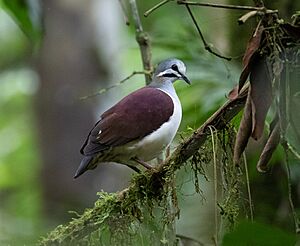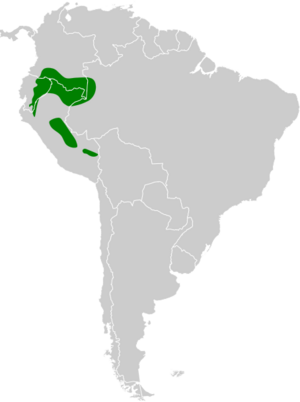Sapphire quail-dove facts for kids
Quick facts for kids Sapphire quail-dove |
|
|---|---|
 |
|
| Conservation status | |
| Scientific classification |
|
| Kingdom: | Animalia |
| Phylum: | Chordata |
| Class: | Aves |
| Order: | Columbiformes |
| Family: | Columbidae |
| Genus: | Geotrygon |
| Species: |
G. saphirina
|
| Binomial name | |
| Geotrygon saphirina Bonaparte, 1855
|
|
 |
|
| Script error: The function "autoWithCaption" does not exist. | |
| Synonyms | |
|
Osculatia saphirina |
|
Script error: No such module "Check for conflicting parameters".
The sapphire quail-dove (Geotrygon saphirina) is a beautiful species of bird. It belongs to the Columbidae family, which includes doves and pigeons. You can find this special bird in parts of Brazil, Colombia, Ecuador, and Peru.
Contents
What is a Sapphire Quail-Dove?
Scientists group living things based on their features. This is called taxonomy. Long ago, the sapphire quail-dove was thought to be the same as the purple quail-dove. They were both part of a larger group called Osculatia saphirina.
However, since the early 2010s, scientists decided the purple quail-dove is a separate species. Now, the sapphire quail-dove has two main types, called subspecies. These are G. s. saphirina and G. s. rothschildi.
How to Spot a Sapphire Quail-Dove
The sapphire quail-dove is about 22 to 26 centimeters (9 to 10 inches) long. It weighs between 139 and 199 grams (4.9 to 7 ounces).
- Males: The male bird has a white forehead, throat, and a small white patch below its eye. It has a clear, long, purple-black stripe on its cheek. Its head is dark bluish-gray, turning bronzy-green on its neck. Below that, it has shiny patches of green, gold, and purplish-pink.
- Body: Its back and wing feathers are purple-brown. The rump (lower back) shines with greenish or purplish-blue colors. The middle tail feathers are dark gray, and the outer ones are blackish with blue-gray tips. When its wing is closed, you can see a long white spot. Its chest is light gray, fading to white on its belly. The sides are a buff color. Its eyes can be pale yellow to dark brown.
- Females and Young Birds: Adult females have similar colors but are not as bright. Young birds are dark reddish-brown on top and grayish underneath. Their face markings are not as strong. The G. s. rothschildi subspecies looks much like the main type, but its eyes are darker.
Where Sapphire Quail-Doves Live
The main type of sapphire quail-dove (G. s. saphirina) lives in southern Colombia. It also lives south through eastern Ecuador to southeastern Peru. You can find it east into the very western part of the Amazon in Brazil.
The G. s. rothschildi subspecies is found only in an area called Cadena. This is in southeastern Peru's Marcapata District. These birds live on the ground and in the undergrowth of evergreen mountain forests. They prefer old, untouched forests and older re-grown forests. They are often found near streams. In Peru, they live up to 1,000 meters (3,300 feet) high. In Ecuador, they can be found up to 1,350 meters (4,400 feet) high.
Sapphire Quail-Dove Behavior
What Sapphire Quail-Doves Eat
The sapphire quail-dove looks for food on the ground. It usually forages alone or in pairs. Scientists have not fully studied its diet. However, like other quail-doves, it probably eats seeds and small insects.
Reproduction
The breeding season for the sapphire quail-dove changes depending on where it lives. This is known from when nests with eggs or young birds were found. It is also known from when adults were ready to breed. Their nests are platforms made of sticks or twigs. They usually lay one or two eggs at a time.
How Sapphire Quail-Doves Communicate
The sapphire quail-dove's song is a simple "hu..huuuuu" or "ca..whooooo." It sings this two-note song from a low, hidden spot or on the ground. They can sing at any time of day.
Conservation Status
The IUCN (International Union for Conservation of Nature) has looked at the sapphire quail-dove. They have assessed it as a species of "Least Concern." This means it is not currently in danger of disappearing. However, scientists say that we do not fully know where this unique bird lives. The biggest threat to this species is the fast rate of deforestation in the Amazon basin. This means forests are being cut down quickly.
 | Leon Lynch |
 | Milton P. Webster |
 | Ferdinand Smith |


